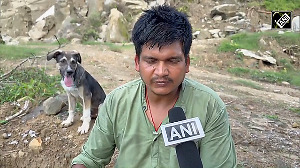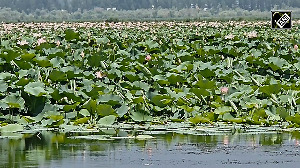'For the first time since I've been following Indian politics, one heard voters talking about India's role on the world stage and the fact that, due to Modi's leadership, India was once again a great power.'
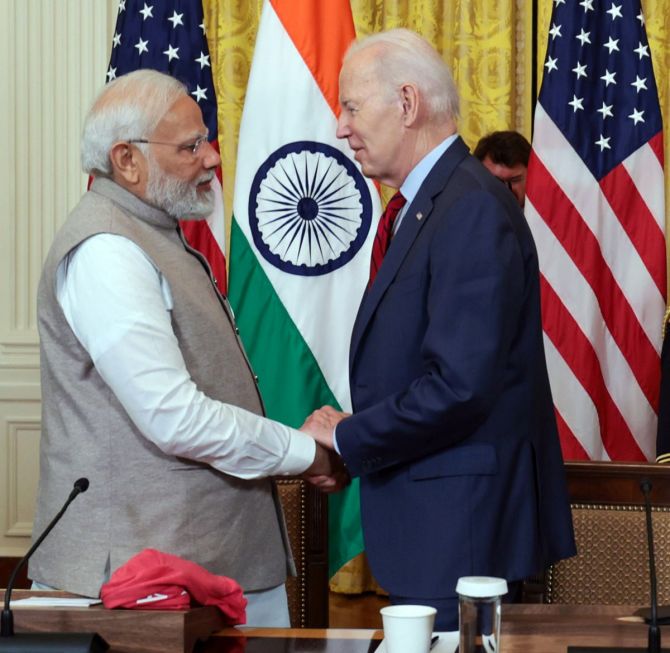
"The BJP occupies pole position, there can be no doubt about that. They have the narrative advantage. They have the organisational advantage. They have the leadership advantage. And they have the financial advantage," says Milan Vaishnav, senior fellow and director of the South Asia Programme and the host of the Grand Tamasha podcast at the Carnegie Endowment for International Peace.
"India's return to 'great power' status will be a theme, punctuated by the G-20 summit. It seems now that the advent of a Uniform Civil Code will also be a theme. Even if it is not implemented before the May 2024 general elections, it will be a key poll plank," Dr Vaishnav tells Rediff.com's Archana Masih in an e-mail interview discussing the domestic significance of the prime minister's US visit.
What do you see as the domestic significance of Narendra Modi's US visit?
As Ashutosh Varshney has noted, political scientists have traditionally divided issues in India into two categories, 'elite' issues and 'mass' issues.
Elite issues concern areas like foreign policy, national security, or trade policy -- matters that are typically debated by a small circle of elites in major cities, but largely ignored by the aam aadmi. The latter, in turn, is thought to be more preoccupied with quotidian concerns like price rise, welfare, jobs, and livelihoods.
What is remarkable to me is that Modi has moved foreign policy from the 'elite' to the 'mass' category. This was first evident in 2019, in the wake of the Pulwama attacks and the response at Balakot, when Modi explicitly sought votes on the basis of India's strong response to the terrorist attacks.
For the first time since I've been following Indian politics, one heard voters talking about India's role on the world stage and the fact that, due to Modi's leadership, India was once again a great power.
I don't mean to suggest that the proverbial man or woman on the street is obsessed with the details of foreign policy in the way that analysts or op-ed writers are. But the PM has increased the popular salience of foreign policy, in my opinion.
I think the recent Biden-Modi summit needs to be seen in this light. Very few Indians will be following the granular details of the GE jet engine deal, Micron's investments in India, or immigration tweaks. But many will see and remember visuals of Modi being given the full-on red-carpet treatment by the world's leading power.
Of course, this Fall's G-20 summit in New Delhi will be the culmination of this campaign to demonstrate how Modi has "put India back on the map."
What are some of the elements of the visit that are going to be used by the BJP for the domestic audience -- and how?
I think there are four ways the BJP will use this visit for a domestic audience.
First, at a macro level, they will use the visuals of Modi's reception -- the pomp and circumstance of the visit -- to convey that India has successfully transitioned from being a balancing to a leading power on the global stage.
Second, the BJP will tout the investments Modi has secured and the enthusiasm the private sector showed towards him as a way of signalling that India is luring some of the world's most powerful companies to Indian soil.
Third, I think the BJP will also use the images of Modi being cheered by members of the diaspora at various events as a way of demonstrating the reach of India's soft power.
For Modi, the Indian diaspora is a force multiplier for Indian foreign policy and furthering Indian interests abroad.
And finally, although India does not want to be seen as an 'ally' of the United States or a pawn in some larger great geopolitical game between the US and China, I do think that the BJP will package some of the summit deliverables as evidence of its tough response to China's actions on the border and in the Indo-Pacific region more generally.

What do you see as Modi's personal stamp on this relationship -- something that he has pushed through singularly himself?
I think Modi's stamp can be seen in at least three ways.
First, I think there is a greater degree of strategic convergence on China between the US and India than ever before. This is partly a function of China's aggressive expansionism, but we should not write off the agency that both Modi and Biden have.
Biden has made a big bet on industrial policy at home and revamping US foreign policy abroad to try and counter the China challenge.
Modi is in the midst of a similar shift. Yes, China's blunders have made this possible, but I don't think the entire shift can be reduced to that alone.
Second, technology has emerged as a major focal point of bilateral cooperation through the initiative on critical and emerging technology (iCET). The fact that this is being driven by the national security advisors in both countries signals just how important this is to the White House and prime minister's office, respectively
Last, but not least, the regular diaspora outreach is a mainstay of the Modi approach. Previous PMs have reached out to the diaspora, but never with the same degree of passion and consistency.
He's employing this outreach not only as a mechanism of soft power diplomacy, but also as a way of encouraging Indians abroad to send remittances, invest capital, and transfer technology back home.
Why has the BJP shown restraint in depicting triumphalism about the visit after the PM's return home?
Union ministers hailed the PM at the Cabinet meeting, but one hasn't seen large public displays lauding the visit that the BJP is wont to usually do.
Frankly, the media coverage was so thick that I am not sure the BJP has to do very much. There was such intense coverage of every aspect of the visit -- from the White House State dinner to the joint Congressional address to the Kennedy Center gala -- that the images and clips reached very far and wide.
It does not matter if you were reading the Washington Post or the Times of India or watching Republic TV or CNN. It was a major feature on all platforms.
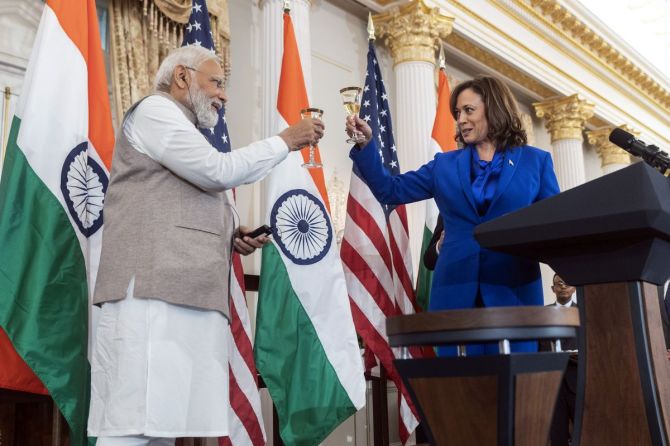
Did the response by ministers to President Obama's comments on Indian democracy overshadow the reactions to Modi's historic visit at home?
I do think this left a sour taste after the 'sweetness' of the visit. Obama's comments on Indian democracy, which he made to Christiane Amanpour of CNN, would have received a fraction of the coverage had various ministers and BJP spokespersons not harped on them.
I understand that they think this scores them domestic political points, but it came across as unseemly. Obama is entitled to his opinion and, frankly, what he said is something many others have said in different contexts.
Obama is clearly a supporter of the US-India relationship. He embraced Modi after he was persona non grata in the United States for almost a decade. He and Modi forged a personal and professional partnership, despite whatever differences they might have had.
Of course, the Government of India is entitled to express its views in whatever ways it sees fit, but the attacks on Obama, especially Himanta Biswa Sarma's majoritarian tweet were over-the-top.
In my view, the most important thing is what the Biden administration is or is not saying --that's what the government should be focused on. Its response to Obama, coupled with the vitriolic attacks on the Wall Street Journal reporter Sabrina Siddiqui -- who asked Modi about minority rights in India during the joint press conference -- was unfortunate to say the least.
I do think it muddied up the post-summit narrative to a certain extent.
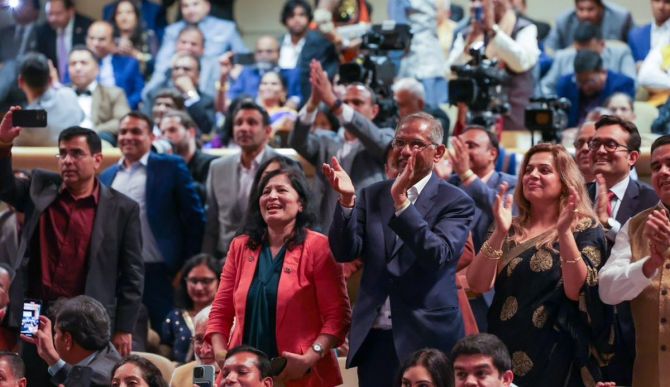
What are some of the talking points/issues that will dominate the political scene till the general election next year? As a watcher of Indian politics, how different is this election going to be?
The BJP occupies pole position, there can be no doubt about that. They have the narrative advantage. They have the organisational advantage. They have the leadership advantage. And they have the financial advantage.
I think India's return to 'great power' status will be a theme, punctuated by the G-20 summit.
It seems now that the advent of a Uniform Civil Code will also be a theme. Even if it is not implemented before the May 2024 general elections, it will be a key poll plank. It's an issue on which the Opposition will likely tie itself up in knots.
Let's not forget that the Ram temple will be ready for inauguration on January 1, 2024. And I think we will see a continued push on welfare delivery, including touting the Har Ghar Jal scheme. That scheme will likely miss its target for universal delivery, but the BJP will be able to cite massive improvements in piped water availability nonetheless.
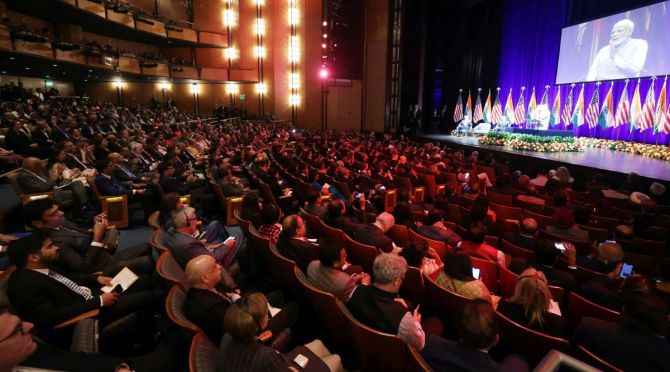
The Opposition has been making attempts to put up a fight against Modi's BJP, but developments like the breaking up of the NCP in Maharashtra, the BRS's plan to expand nationally (there are huge billboards of KCR in Mumbai) etc.
What does all this portend in the run-up to 2024? How different is the Opposition likely to be this time around?
This is a huge question mark and I am not certain where the Opposition will land up. It seems that there are big hurdles to overcome if the objective is to form a Janata Party-like coalition ahead of the elections.
Unlike the Emergency period, when a feeling of crisis forced parties to join forces, I am not sure a similar forcing function exists today.
The Congress is feeling more confident after Karnataka and thinks it has a good shot at bagging several state elections this winter.
The Aam Aadmi Party too has eyes on expanding its footprint, including in states where the Congress has been the principal rival to the BJP. So, the crystal ball is not very clear.
My sense is we are headed to a situation closer to 2019 where we see opportunistic alliances in some states to try and keep the BJP out of power, but competition between the Opposition in others where seat-sharing arrangements will be harder to come by.
This kind of fragmented response will likely help the BJP.
Feature Presentation: Aslam Hunani/Rediff.com









